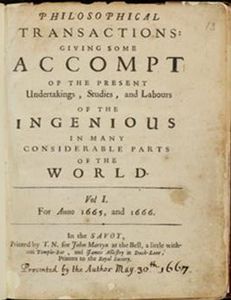
This month marks a milestone in modern scientific publishing. Back when science was called Natural Philosophy and the practice of medicine straddled the line between alchemy and butchery, the Royal Society started publishing (what is considered) the first peer-reviewed scientific journal. Volume 1 of Philosophical Transactions: Giving Some Accompt of the Present Undertakings, Studies, and Labours of the Ingenious in Many Considerable Parts of the World (as it was fully titled) was published 350 years ago this month.
The journal, which started as the Royal Society’s secretary Henry Oldenburg’s pet-project, was intended to communicate the most current information to society members and other scientifically minded readers. Since it’s first appearance in 1665, Philosophical Transactions has continued publication through plagues, wars, competition, and scandal. Continue reading